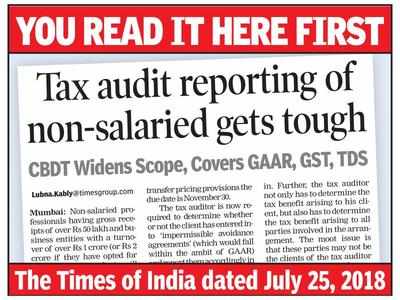- News
- Business News
- India Business News
- Non-salaried get relief in tax audit reporting; CBDT puts off reporting on GAAR, GST
Trending
This story is from August 18, 2018
Non-salaried get relief in tax audit reporting; CBDT puts off reporting on GAAR, GST

Mumbai: The Central Board of Direct Taxes (CBDT) has postponed reporting by tax auditors of transactions that would be covered by general anti-avoidance rules (GAAR). Also, various GST-related details will not be required to be submitted in the tax audit report for the financial year ended March 31, 2018. This move is being welcomed by tax professionals.
Business entities having a turnover of more than Rs 1 crore (or Rs 2 crore if they have opted for presumptive taxation) and non-salaried professionals having gross receipts of more than Rs 50 lakh have to comply with the I-T audit requirements.
After which, the tax auditor files his report in Form 3CD. The due date for its filing is September 30. If the taxpayer is covered by transfer pricing provisions, the due date is November 30. The CBDT had revised Form 3CD on July 20, which required many new details to be furnished. In its edition dated July 25, TOI was the first to analyse the challenges that the new reporting norms entailed.
In a circular issued on Friday, the CBDT clarifies that, in the backdrop of representations received, implementation of reporting requirements in Form 3CD under proposed clause 30C (pertaining to GAAR) and proposed clause 44 (pertaining to GST) will be deferred. Reporting on these two issues has been kept in abeyance till March 31, 2019. The circular adds, for tax audit reports required to be furnished on or after August 20 (which is the date the new form became effective) but before April 1, 2019, tax auditors will not be required to furnish these details.
Experts had said that this amounted to the tax auditor giving an opinion rather than reporting on facts, say, on whether an M&A transaction was undertaken to avoid tax. Second, the tax benefit arising to all the parties to the transaction was to be reported and the tax auditor would not be privy to such information.
The Chamber of Tax Consultants’ president Hinesh Doshi says the association also pointed out in its representation to the CBDT that it is only the income tax officer who has the power to declare a transaction as an impermissible tax avoidance arrangement. The revised form required tax auditors to look at details of all expenditure incurred by the taxpayer and classify whether the corresponding payment was to a GST-registered entity or not. Various other details were also required. “We had pointed out that such details are already available with the GST system,” states Doshi.
Echoing the response of taxpayers and tax professionals, KPMG India international tax head Himanshu Parekh says, “The move to defer reporting on both GAAR- and GST-related points is welcome and will provide respite to tax payers and tax auditors, especially since the new requirements were issued closer to the due dates.”
Business entities having a turnover of more than Rs 1 crore (or Rs 2 crore if they have opted for presumptive taxation) and non-salaried professionals having gross receipts of more than Rs 50 lakh have to comply with the I-T audit requirements.
After which, the tax auditor files his report in Form 3CD. The due date for its filing is September 30. If the taxpayer is covered by transfer pricing provisions, the due date is November 30. The CBDT had revised Form 3CD on July 20, which required many new details to be furnished. In its edition dated July 25, TOI was the first to analyse the challenges that the new reporting norms entailed.
In a circular issued on Friday, the CBDT clarifies that, in the backdrop of representations received, implementation of reporting requirements in Form 3CD under proposed clause 30C (pertaining to GAAR) and proposed clause 44 (pertaining to GST) will be deferred. Reporting on these two issues has been kept in abeyance till March 31, 2019. The circular adds, for tax audit reports required to be furnished on or after August 20 (which is the date the new form became effective) but before April 1, 2019, tax auditors will not be required to furnish these details.
In the revised form, the tax auditor was required to determine whether the client had entered into ‘impermissible avoidance agreements’, which would fall within the ambit of GAAR and report them accordingly.
Experts had said that this amounted to the tax auditor giving an opinion rather than reporting on facts, say, on whether an M&A transaction was undertaken to avoid tax. Second, the tax benefit arising to all the parties to the transaction was to be reported and the tax auditor would not be privy to such information.
The Chamber of Tax Consultants’ president Hinesh Doshi says the association also pointed out in its representation to the CBDT that it is only the income tax officer who has the power to declare a transaction as an impermissible tax avoidance arrangement. The revised form required tax auditors to look at details of all expenditure incurred by the taxpayer and classify whether the corresponding payment was to a GST-registered entity or not. Various other details were also required. “We had pointed out that such details are already available with the GST system,” states Doshi.
Echoing the response of taxpayers and tax professionals, KPMG India international tax head Himanshu Parekh says, “The move to defer reporting on both GAAR- and GST-related points is welcome and will provide respite to tax payers and tax auditors, especially since the new requirements were issued closer to the due dates.”
End of Article
FOLLOW US ON SOCIAL MEDIA
















